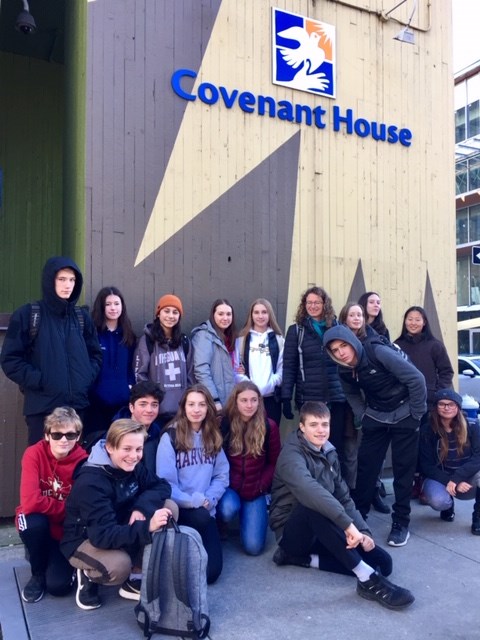Every year, the grade nine Island Pacific School class sleeps one uncomfortable night outside.
Students hunker down behind their school, a two-dollar dinner in their bellies, trying get enough sleep to get through their tests and school work the next day.
The sleep out, intended to simulate homelessness, is a fundraiser for youth agency Covenant House. While many schools participate in the event, IPS assistant head Jennifer Henrichsen said that the Bowen school takes it a step further.
The students first visit Covenant House in Vancouver and help sort clothing (they cannot actually go inside due to privacy issues). Then, under the supervision of an adult, they get a toonie each for their suppers and they explore the Downtown Eastside, trying to get a feel for what it might be like for youth who have unstable or no housing. The students are then bussed back to Bowen where they have a campfire, a debrief, and then they sleep out behind the school.
“It’s not a scare tactic or anything like that. It’s creating empathy for people who have had life experiences that have ended up with them on the street,” said Henrichsen, one of two organizers of the school’s event.
This year’s IPS iteration took place February 20 and raised $12,000, through an online donations page, for Covenant House. Over the past five years, IPS students have raised $40,000 for the organization.
After the exercise is over, the students write reflections and Henrichsen said that students’ reactions year to year are similar.
“The people living on the streets are so incredibly strong, and they persevere through everything however difficult. Why is it then that people look down on the homeless, lock their doors when they drive past?” Wrote one grade nine Island Pacific School student.
“Before this experience with Covenant House I had always put up that barrier between me and the people on the streets. This helped me learn that there is really no reason to. I understand that doing that can make anyone feel invisible,” wrote another student.
“Everyone deserves kindness. Even in the smallest form of a smile or a hello.”
“The ground was rocky and uncomfortable and hard to get to sleep with temperatures below zero,” wrote another. “As a homeless person they must always be tired and sore and stressed 24/7.”
Henrichsen said that the sleep out is the culmination of four years of community service work at IPS. Students volunteer for local organizations during their time at the school and take on projects that interest them.
“The students actually drove this,” said Henrichsen. “They wanted to have an action component to their community service and they wanted it to help kids their age. So that’s how we hooked up with Covenant House.”
“I feel like most people think homelessness is their fault, because they chose to abuse drugs. That just really isn’t the case, there are so many other factors they didn’t have any choice in,” said another student. “I feel now, walking down the street, I will know to have more sympathy and that they are human too.”
Some other responses from students:
“I always want to give change to every homeless person I see but I’m glad Covenant House has given me the opportunity to do more. When my group pooled our change and gave it to an elderly woman named Kris - she lit up. She was so grateful even though it was only a small sum. I felt proud and happy.”
“It is sad to think that these people and kids have so much potential to do amazing things in life and live normally, but one bad thing after another happens and they end up homeless. They are people just like us and you never know what path life will take you on.”
“Even though many are in a seriously tough time, we still saw many faces smiling and laughing. Even though these people have little to nothing they still have friends and a community.”
“I think it made me ton more grateful for what I have, how I live, my family and all the privileges that I take for granted.”



